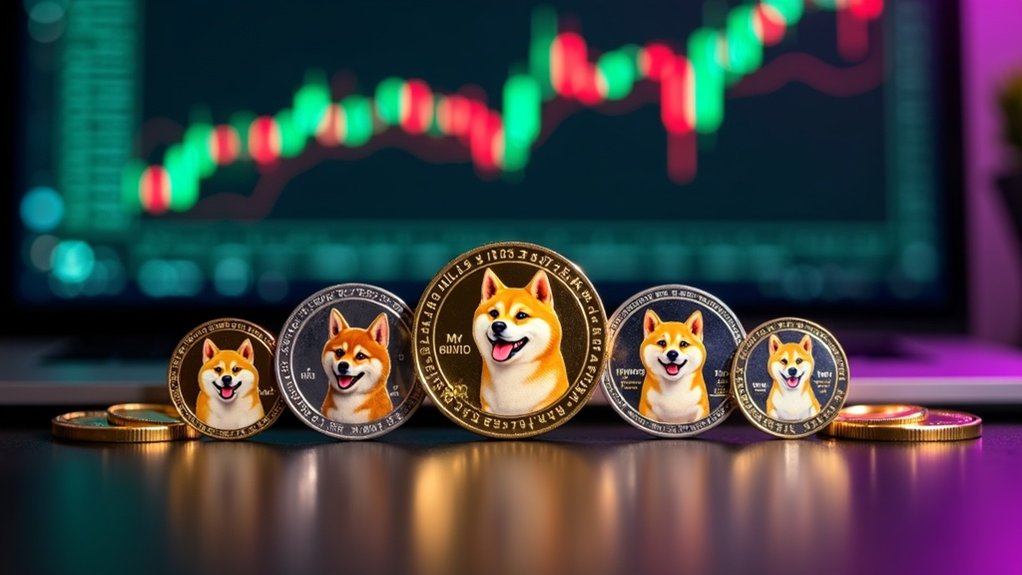The metaverse blends blockchain technology with virtual reality, creating digital universes where people live through avatars. Users own and trade virtual assets—land, clothing, art—as NFTs with real-world value. Blockchain guarantees transparent transactions while DAOs replace corporate control. Your crypto wallet serves as your passport to this digital world. Virtual economies operate on cryptocurrency, enabling play-to-earn mechanisms for actual income. The lines between physical and digital existence continue blurring with each technological leap forward.
The metaverse is here, ready or not.
It’s a sprawling virtual world where people live digital lives through avatars, buying virtual land and trading digital goods like they’re actually worth something.
And guess what? They are.
This isn’t just some fancy video game—it’s an immersive world built on blockchain technology where users call the shots through DAOs instead of submitting to corporate overlords.
The metaverse isn’t playtime—it’s revolution through code, where DAOs replace CEOs and users hold the power.
Think of it as a digital universe where your crypto wallet is your passport.
No wallet, no entry.
These virtual economies run on their own cryptocurrencies, letting users buy everything from digital real estate to ridiculous avatar outfits.
Smart contracts handle the boring stuff, automatically executing transactions without middlemen taking a cut.
Because who needs more fees?
Virtual land in the metaverse isn’t just pixels—it’s an investment.
People are dropping serious cash on digital plots, sometimes millions in cryptocurrency.
Businesses are setting up virtual offices.
Banks are offering loans for digital property.
It’s real estate without the termite inspections or leaky roofs.
Your avatar isn’t just a pretty face.
It’s your digital identity, following you across platforms with your blockchain-backed credentials keeping everything in order.
Your crypto wallet holds more than coins—it’s stuffed with your metaverse assets, identity, and status symbols.
Those digital Gucci shoes? They’re NFTs now, with verifiable ownership and scarcity.
Many users engage in play to earn mechanics to generate real income through gameplay and trading virtual assets.
The technology making this possible? VR headsets transport users into fully immersive environments while AI creates responsive interactions that almost feel human.
Almost.
Blockchain keeps everything transparent and secure, while NFTs guarantee your digital Picasso isn’t copy-pasted into oblivion.
The metaverse isn’t just gaming—it’s the merger of social networks, financial systems, and digital creativity into one sprawling ecosystem.
Major tech giants like Meta, Apple, Microsoft, Google, and Nvidia are all developing spatial computing technologies to shape how we’ll interact with these virtual worlds.
The concept has evolved dramatically since being coined in 1992 by Neal Stephenson in his science fiction novel Snow Crash, where it was first envisioned as a virtual reality-based successor to the internet.
It’s redefining ownership, creativity, and community.
Like it or not, the virtual and physical worlds are colliding.
And cryptocurrency is the glue holding this digital fever dream together.
Frequently Asked Questions
How Can I Invest in Metaverse Projects?
Investors can grab metaverse opportunities through several channels.
Buy tokens like MANA, SAND, or AXS on crypto exchanges.
Snag virtual land or NFT assets directly from platforms like Decentraland or The Sandbox.
Some folks prefer metaverse-focused ETFs or stocks of companies building these digital worlds.
Play-to-earn games let users earn while playing.
Staking tokens generates passive income.
Not rocket science, really. Just need a wallet and some research.
What Hardware Is Needed to Access the Metaverse?
Accessing the metaverse requires varying hardware depending on how deep you want to go.
Basic entry? A smartphone or tablet will do.
Want the full experience? You’ll need a VR headset like Meta Quest or HTC Vive.
Don’t forget a decent computer with good graphics for the heavy lifting.
Throw in some quality headphones for immersion.
Internet connection is non-negotiable—faster the better.
Advanced users might splurge on haptic gloves, but they’re not essential. Yet.
Are Metaverse Assets Taxable in Real Life?
Yes, metaverse assets are taxable in real life. No escaping the tax man—even in virtual worlds.
Most jurisdictions treat NFTs and virtual land sales as capital gains events, with rates up to 28% in some places.
Making income from renting metaverse property? That’s regular income tax territory.
The IRS doesn’t care if you got paid in crypto or dollars. Tax authorities are still figuring out jurisdictional issues, but they’re definitely coming for those digital profits.
How Secure Are Metaverse Transactions?
Metaverse transactions have serious security gaps.
They’re built on blockchain—transparent but vulnerable.
Smart contracts? Immutable once deployed. Bad code means lost money. Period.
Wallet security is everything since they hold your entire digital identity and assets.
ENS squatting and address theft happen regularly.
Regulatory protection? Nearly non-existent.
Crypto theft hit $3.7 billion in 2022 alone.
Multi-factor authentication helps, but honestly, the metaverse is still the digital Wild West. No sheriff in sight.
Can Metaverse Currencies Be Exchanged for Real-World Money?
Yes, metaverse currencies can absolutely be converted to real money.
Users transfer tokens from digital wallets to crypto exchanges that support them, then cash out to fiat.
The process isn’t always smooth, though. Market volatility means today’s fortune could be tomorrow’s pocket change. Liquidity varies wildly.
Some platforms use native cryptocurrencies to simplify the process.
Play-to-earn games have created legitimate income streams for players worldwide. Not bad for “fake” money, right?









